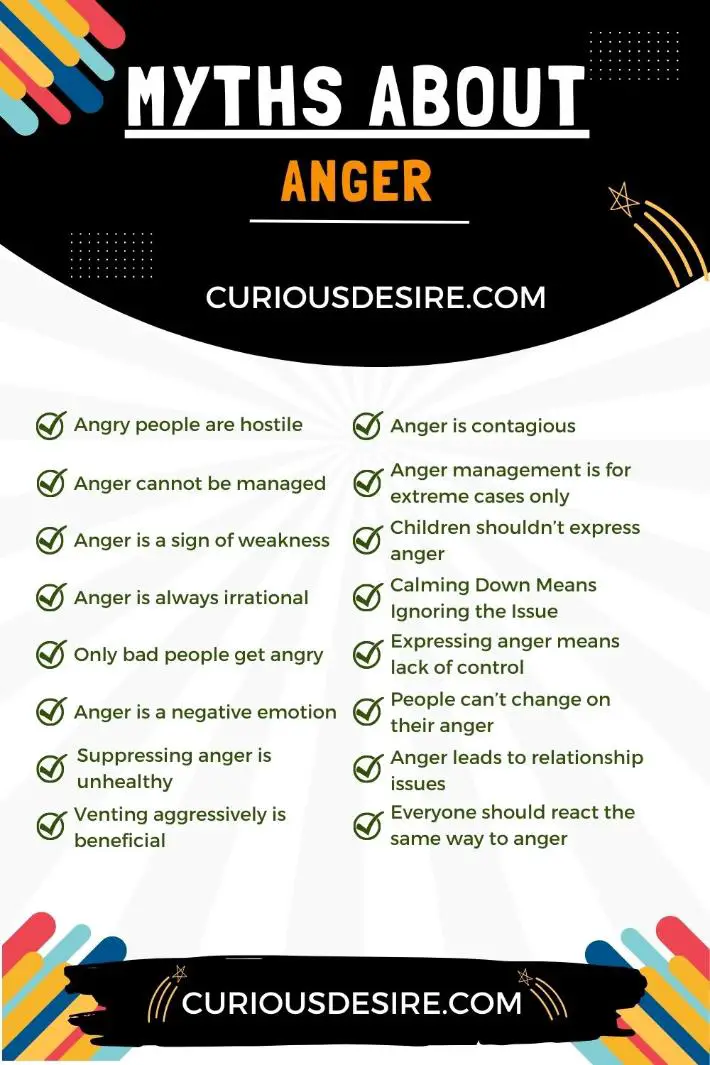Anger is a fundamental human emotion we all get when we’re upset, frustrated, or feel treated unfairly, yet it has been surrounded by so many myths that have influenced humans to perceive and handle it in a way that is unhealthy for the person and people around them.
This article will take you through a journey that will help you debunk these unnecessary myths. It is time to unlearn and forget the information you already know about anger.
5 Most Common Myths About Anger:
- Children Shouldn’t Express Anger
- Anger cannot be managed
- Angry People are Always Hostile
- You Can’t Change How You Deal With Anger
- Anger is a Sign of Weakness

Myth 1: Venting Aggressively is Always Beneficial
Why is it believed:
The belief in the cathartic nature of aggressive venting comes from the idea that letting out anger is a release, a way to unburden oneself and find relief from the overwhelming emotion.
Many perceive aggressive venting as a quick and effective way to alleviate the immediate emotional pressure associated with anger. It’s often seen as a spontaneous, instinctive reaction to a perceived injustice or frustration.
Busting the Myth:
While it can provide a temporary emotional release, the expression of anger can reinforce negative behaviors. Research indicates that it may perpetuate a cycle of aggression and escalate emotions.
Constructive expression, coupled with problem-solving, is a more effective and lasting strategy for managing anger.
This approach addresses the root causes of anger and promotes a healthier emotional response, breaking the cycle of aggressive venting.
Myth 2: Suppressing Anger is Always Unhealthy
Why is it believed:
It is commonly thought that suppressing anger is an unhealthy activity and often arises from the notion that expressing one’s emotions is inherently beneficial.
Holding in one’s anger is considered to lead to negative consequences, both emotionally and physically. This belief suggests that immediate expression of anger is a healthier and more authentic way to deal with the emotion, avoiding potential long-term harm.
Busting the Myth:
The truth is that everything should work in a balance. Chronic suppression without addressing the real issues can indeed be harmful.
Immediate suppression when done thoughtfully can be a healthy strategy to gain composure and respond thoughtfully.
It is always about finding a middle ground where acknowledging and addressing the anger issues can occur without letting it aggravate beneath the surface.
Myth 3: Angry People are Always Hostile
Why is it believed:
There is a societal assumption that anyone expressing anger is on the verge of becoming confrontational or openly aggressive.
This misconception oversimplifies the diverse ways individuals experience and express anger, often leading to a generalization that all angry individuals are inherently hostile. The tendency to make quick judgments and label angry individuals as universally aggressive contributes to the persistence of this belief.
A psychological bias called the “hostile attribution bias” exists, wherein individuals tend to perceive unclear actions as hostile or aggressive, particularly when they are already experiencing anger.
Busting the Myth:
Anger manifests differently in individuals. While some express it openly, others hide their feelings, which leads to irritability or withdrawal.
Understanding this spectrum of expressions is crucial for recognizing that not all angry individuals are inherently hostile. People can experience anger without necessarily displaying aggressive behavior.
Myth 4: Anger is Always Irrational
Why is it believed:
This perception often arises from instances where anger leads to intense emotional reactions, giving the impression that the emotion itself lacks a logical foundation.
Additionally, societal narratives may contribute to portraying anger as an uncontrollable and irrational force, further solidifying this belief.
The oversimplification of anger as a purely emotional and irrational response overlooks its potential as a valid emotional reaction.
Busting the Myth:
Anger often signals underlying issues or unmet needs. While impulsive reactions can occur, acknowledging and addressing the root causes allows individuals to channel anger constructively.
It’s about recognizing the rational aspect of this emotion and using it for personal growth and improved relationships.
Myth 5: Anger is a Sign of Weakness
Why is it believed:
Expressing anger is sometimes associated with losing control or an inability to manage emotions.
There exists a cultural narrative that equates strength with emotional suppression, and individuals who openly express anger may be perceived as lacking self-discipline or resilience. This misconception often leads to the notion that strong individuals should remain composed and unaffected by emotional turmoil, including anger.
Busting the Myth:
Expressing anger does not equate to weakness. It’s a natural and universal emotion. Strength lies in how individuals handle and express their anger.
Seeking constructive solutions, communicating assertively, and managing emotions effectively are signs of emotional intelligence, resilience, and strength, not weakness.
Myth 6: Only “Bad” People Get Angry
Why is it believed:
There exists a societal misconception that anger is solely associated with bad people who are morally flawed individuals. People may believe that expressing anger makes someone inherently bad or aggressive.
Oversighting this complex emotion of anger and relating it with the moral character of an individual has been a widely held belief of society for a long time.
Busting the Myth:
Anger is a universal emotion experienced by everyone. It’s not an indicator of moral character but rather a response to various stimuli and situations.
Understanding that anger is a natural part of the human experience and separating the expression of anger from moral judgments we can dispel the notion that only “bad” people get angry.
Myth 7: Anger is Contagious
Why is it believed:
People often tend to stay away from a person who is always angry considering that if they stay with such a person they will also get angry due to them.
Anger is often thought to possess a contagious quality, influencing the emotions of those in proximity. This belief may be influenced by observations of emotional mirroring, where individuals unintentionally adopt the emotional states of those around them.
Busting the Myth:
While emotions can be influential, individuals have control over their emotional responses. Not everyone will “catch” anger from someone else.
Recognizing and managing one’s emotions independently is crucial for dispelling the idea that anger is inherently contagious. People can maintain emotional boundaries and choose how to respond to the emotions of those around them
Myth 8: Anger Management is Only for Extreme Cases
Why is it believed:
Debunking the Myth:
Managing your anger skills is valuable for everyone, not just those with extreme cases.
Learning effective ways to handle and express anger can benefit individuals in various aspects of their lives, contributing to healthier relationships and personal well-being.
Anger management is not solely about addressing extreme behaviors; it encompasses a range of strategies for individuals to navigate and understand their emotions constructively
Myth 9: Children Shouldn’t Express Anger
Why is it believed:
There exists a prevailing notion that children should always be calm and well-behaved, and any expression of anger may be perceived as a sign of disobedience or lack of discipline, based on traditional views on child behavior.
Adults, including parents and caregivers, may hold the belief that a child’s display of anger is undesirable and should be suppressed to maintain order and discipline in the household.
Debunking the Myth:
Children, like adults, experience a range of emotions, including anger.
Parents and elders have a responsibility toward children, to teach them healthy ways to express and manage their anger.
Suppressing a child’s emotions, including anger, may lead to difficulties in understanding and handling these emotions as they grow older. Encouraging children to express their emotions constructively fosters emotional intelligence and helps them develop a healthy relationship with their feelings.

Myth 10: Expressing Anger Means You Lack Control
Why is it believed:
There’s a perception that individuals who openly show anger are incapable of managing their feelings and resort to emotional outbursts.
This belief is fueled by cultural norms that emphasize emotional restraint and the expectation that people should always remain composed, especially in challenging situations. The visible intensity of anger can lead to the misconception that those expressing it are unable to regulate their emotions effectively.
Debunking the Myth:
Expressing anger does not necessarily mean a lack of control. Control is about how one chooses to express and channel that anger.
Individuals can learn to communicate their feelings assertively and manage their emotions effectively without losing control. It involves developing the skill to express anger constructively, addressing the underlying issues, and finding solutions.
Myth 11: Anger is Always a Choice
Why is it believed:
The belief that individuals can always choose not to feel anger is rooted in an oversimplification of emotional responses implying that emotions, including anger, are entirely within one’s conscious control.
Individuals are expected to be able to maintain emotional composure regardless of the circumstances. Moreover, there is a lack of understanding about the involuntary nature of certain emotional responses and the complexity of human emotions.
Debunking the Myth:
While individuals can influence how they respond to anger, the initial feeling itself is not always a conscious choice.
Recognizing that emotions can be complex, and influenced by various factors, including past experiences, biological factors, and environmental stimuli.
Recognizing the involuntary aspects of emotional responses allows for a more compassionate understanding of human emotions
Myth 12: Calming Down Means Ignoring the Issue
Why is it believed:
There may be a perception that taking a moment to calm down is a form of avoidance or escapism, suggesting that individuals who choose to step back from a heated situation are neglecting the underlying problem.
Stepping away from a conflict is also considered to be a sign of weakness by society, forcing people to behave differently in such situations.
Debunking the Myth:
Taking a moment to calm down does not equate to ignoring the issue. It’s a strategic pause to gain composure and respond thoughtfully rather than react impulsively.
Calming down allows individuals to approach the problem with a clearer and more rational mindset, facilitating a more constructive resolution. It involves acknowledging the emotions without being overwhelmed by them and creating space for a more intentional response.
Myth 13: You Can’t Change How You Deal With Anger
Why is it believed:
People think that once established, patterns of dealing with anger are fixed and resistant to change. This thing comes from a perceived sense of deep-rooted habits and personal limitations.
This belief may also be influenced by experiences of repeated, seemingly automatic reactions to anger, reinforcing the idea that one’s approach is fixed.
Debunking the Myth:
Contrary to the belief, Individuals can learn and adopt healthier ways of managing anger.
With self-awareness, commitment, and the right strategies, people can change their patterns of dealing with anger over time. This thought that change is not possible is false. Every human can change.
Recognizing that personal growth and transformation are ongoing processes allows individuals to actively engage in learning and implementing more constructive ways of dealing with anger

Myth 14: Anger Always Leads to Relationship Damage
Why is it believed:
There is a widespread notion that any manifestation of anger, whether through words or actions, has an inherently negative impact on relationships.
This belief might be fueled by personal experiences or observations where uncontrolled anger led to conflicts, strained connections, or even relationship breakdowns.
Debunking the Myth:
While uncontrolled and aggressive expressions of anger can strain relationships, it’s how anger is expressed that determines its impact.
Healthy communication, coupled with effective anger management, can strengthen relationships by addressing underlying issues.
Expressing anger assertively, understanding each other’s perspectives, and working towards resolution can foster understanding and growth within a relationship

Myth 15: Anger is Always a Negative Emotion
Why is it believed:
The visibility of intense and uncontrolled anger in various media forms may contribute to the perception that anger is solely a source of negativity.
Society often categorizes emotions into positive and negative, and anger is frequently placed in the latter category, oversimplifying the complex nature of this emotional behavior.
Debunking the Myth:
Anger, when understood and managed effectively, can have positive aspects. It serves as a natural response to perceived threats, injustice, or unmet needs. Anger can motivate individuals to set boundaries, advocate for themselves, and instigate positive changes
Recognizing the dual nature of anger allows individuals to harness its energy for constructive purposes.
Myth 16: Anger Can’t be Understood or Managed
Why is it believed:
Personal struggles or witnessing others who struggle with anger management could contribute to the misconception that anger is such an overwhelming and uncontrollable force that makes it difficult to manage.
Societal tendency to downplay the importance of emotional intelligence and coping skills leads to the misconception that certain emotions, like anger, are beyond comprehension or control.
Debunking the Myth:
Numerous tools and strategies, including therapy, mindfulness, and communication skills, exist to help individuals understand and manage their anger.
Acknowledging that anger is a natural emotion and seeking appropriate support can lead to effective management.
Embracing a proactive approach to emotional well-being allows individuals to navigate and cope with anger healthily.
Myth 17: Everyone Should React the Same Way to Anger
Why is it believed:
There’s a misconception that there’s a one-size-fits-all approach to expressing and managing anger. People may assume that everyone should react identically to anger-inducing situations.
Cultural influences further propagate the notion that an ideal or correct manner exists for individuals to navigate situations that provoke anger. This belief is reinforced by a desire for predictability in emotional reactions, disregarding the inherent diversity in human responses and experiences.
Debunking the Myth:
Recognizing and respecting diverse approaches to anger expression allows for more effective communication and understanding in relationships.
Anger Myth FAQs
1. Why do some believe venting aggressively is always beneficial?
It’s deeply embedded, and seen as a cathartic release. However, research shows it may perpetuate aggression.
2. Is suppressing anger always unhealthy?
Not necessarily. Immediate suppression for composure can be healthy, but chronic suppression without addressing issues is harmful.
3. Do angry people always display hostility?
No, anger manifests differently. Some express themselves openly, while others may hide feelings, leading to irritability or withdrawal.
4. Is anger always irrational?
No, anger often signals underlying issues or unmet needs. Acknowledging root causes allows for constructive channeling.
5. Does expressing anger indicate weakness?
No, expressing anger is natural. Strength lies in how individuals handle and express their anger.
6. Is anger only for “bad” people?
No, anger is universal. It’s not an indicator of moral character but a response to various stimuli.
7. Should everyone express anger openly?
While open communication is important, expressing anger recklessly can lead to negative consequences.
8. Is anger contagious?
No, individuals have control over their emotional responses. Not everyone will “catch” anger from someone else.